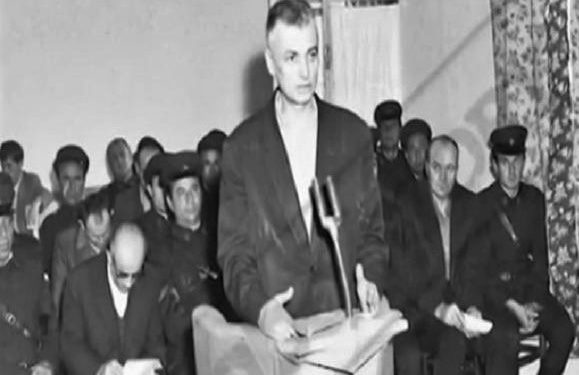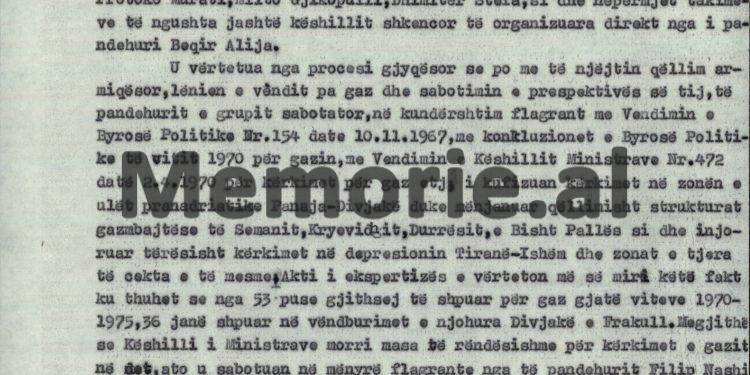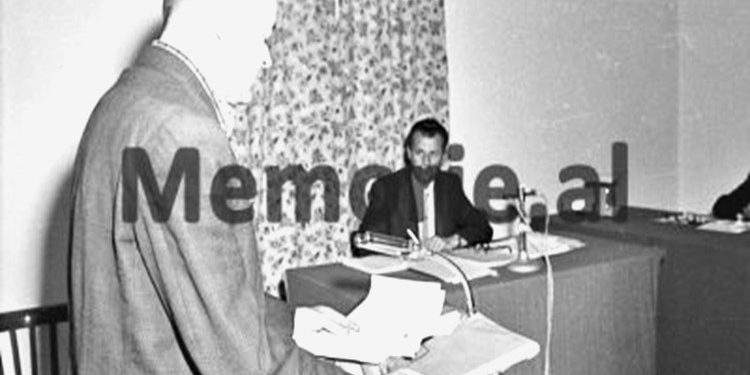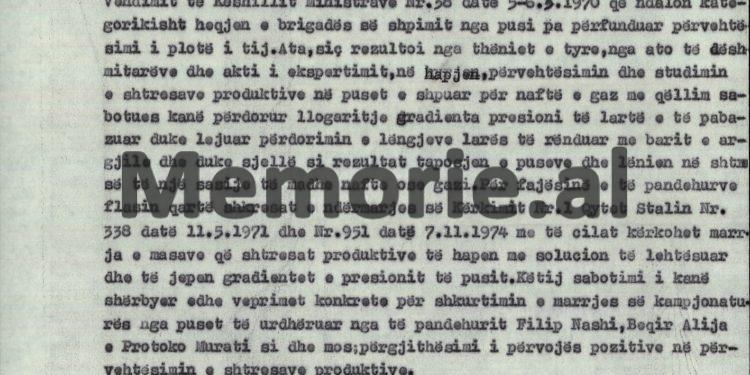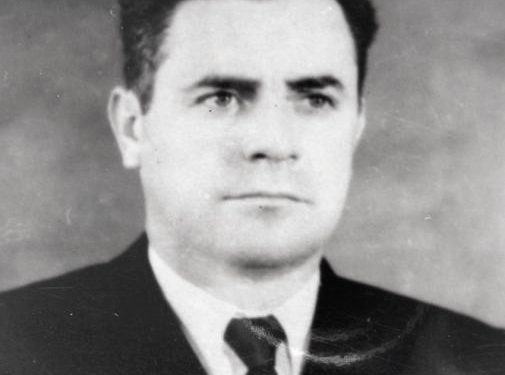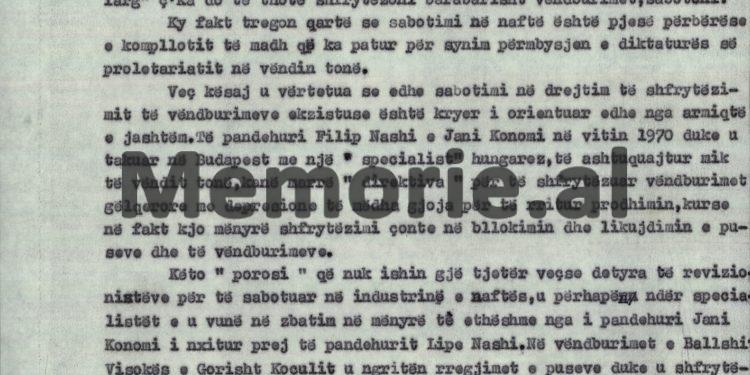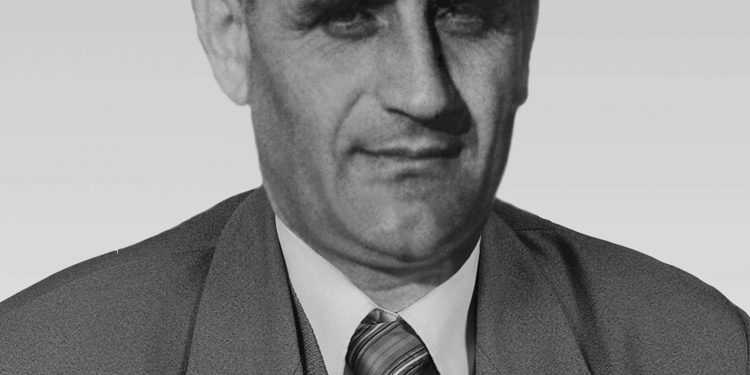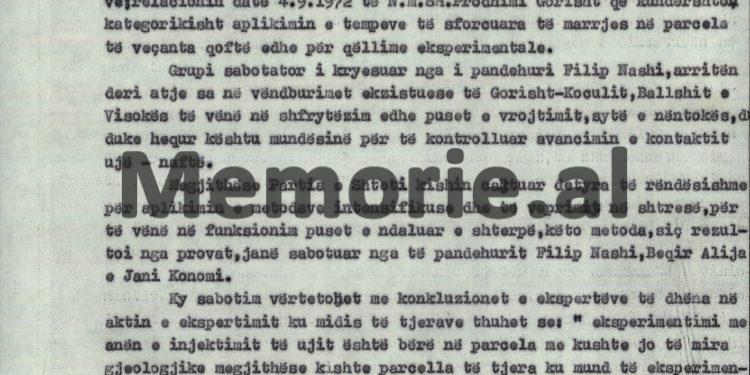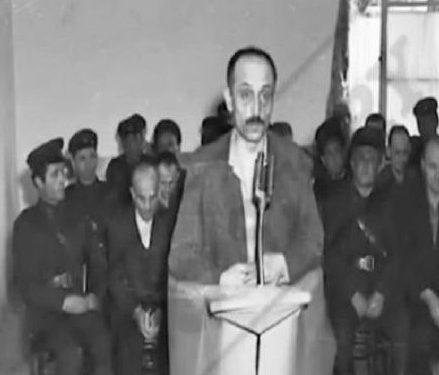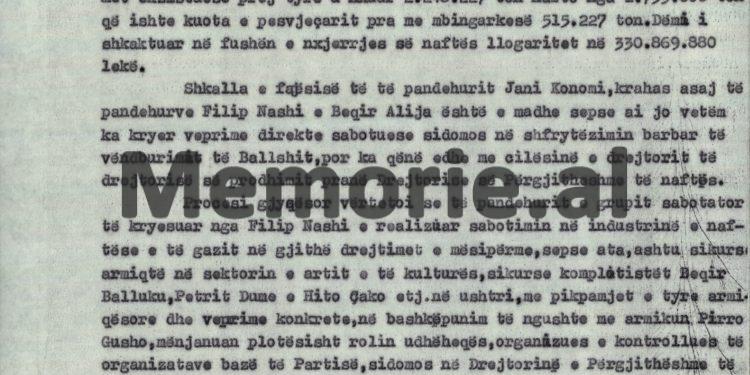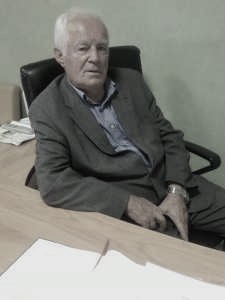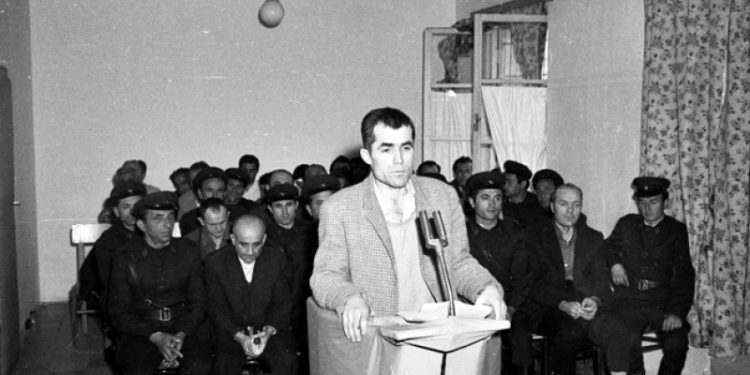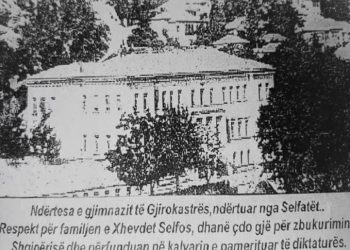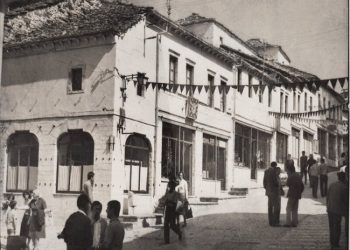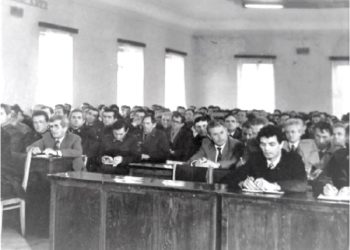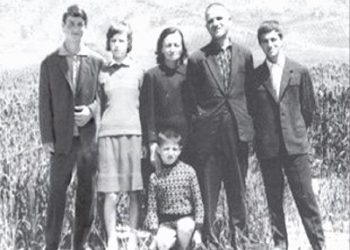By Dashnor Kaloçi
The Eleventh Part
Memorie.al / From the end of November 1944, when he officially came to power, until he died in 1985, the communist dictator Enver Hoxha, wanting to resemble his idol, Iosif Vissarionovich Stalin, and following his “path,” would occasionally undertake purges in the top leadership of the PPSH (Party of Labour of Albania), something he had practically started in 1941, with Anastas Lula and Sadik Premte, continued with Koçi Xoxe (and his group) in 1948-’49, and ended in 1981-’82, with the so-called “Hostile Group of Mehmet Shehu and Kadri Hazbiu.” In this time interval of more than four decades, as is now known, he eliminated almost all the founders of the Albanian Communist Party, the members of the Political Bureau of the Central Committee of the PPSH, and the main leaders of the so-called “National Anti-Fascist Liberation War,” so much so that from 1960 until the collapse of the communist regime in 1990, only Pilo Peristeri had escaped prison or internment, enjoying the privileges as a perpetual candidate of the Political Bureau and the function of director of the “Enver Hoxha” Autotractor Combine!
But, unlike what he had done until the beginning of the ’70s, where Enver Hoxha’s “sword” had fallen mainly on the top leadership of the PKSH (Communist Party of Albania) (Koçi Xoxe, Kristo Themelko, Sotir Vullkani, Ramadan Çitaku, Tuk Jakova, Bedri Spahiu, Liri Gega, Gjin Marku, Koço Tashko, Liri Belishova, etc.), whom he had accused of “deviating from the Party line” and had condemned as “traitors and enemies of the people,” in the mid-70s, dictator Enver Hoxha also began to crack down on some members of the Political Bureau who also held ministerial posts, such as Abdyl Këllezi and Koço Theodhosi, accusing them also as “saboteurs of the Socialist Economy”!
And just as he had done with Beqir Balluku, Petrit Dume, and Hito Çako (who were sentenced to death and executed), where to prove their “hostile activity,” Enver Hoxha sentenced a large group of high-ranking officers to prisons and internment, with the so-called “Saboteur Group of the Economy,” where in addition to Këllezi and Theodhosi, the two ministers Kiço Ngjela and Vasil Kati were also part, several high officials of the Trade sector, well-known directors and specialists were accused and convicted, such as Andrea Manço, Ahmet Jegeni, Bardhyl Frashëri, etc., as well as from the Oil sector, such as; well-known leaders, engineers, and specialists, such as; Filip Nashi, Beqir Alija, Koço Plaku, Milto Gjikopulli, Protoko Murati, Dhimitër Stefa, Jani Konomi, Nuredin Skrapari, etc.
As we will see in the documents in question, the investigative process against the so-called “Hostile and Saboteur Group of the Economy,” which had been carried out by the Ministry of Internal Affairs and State Security, with fabricated charges and false testimonies or those obtained under torture, etc., was also continued by the Supreme Court of the People’s Republic of Albania, headed by Aranit Çela, “channeling” the accusations from the “legal” side as well, to “prove” what Enver Hoxha had said in the Plenums of the Central Committee of the PPSH, against Abdyl Këllezi, Koço Theodhosi, Kiço Ngjela, Vasil Kati, etc.
Regarding all of these, after the 90s, much has been said and written, both by members of those “groups,” their family members, etc., etc. Memorie.al has secured the archival documents of the Supreme Court of the People’s Republic of Albania of that time and the former Presidium of the People’s Assembly, where the “Hostile Group of the Economy,” “Trade,” and “Oil” was examined, which are seeing the light of publication for the first time, documents that we are publishing in several issues, along with the corresponding photos and facsimiles.
In the first and second part of this series of writings, we are publishing documents that talk about the former director of Makinaimport, Andrea Manço, originally from the village of Boboshtica in Korça, whose brother Todo Manço, for years had served as chief engineer and director of the Bulqiza chrome mine, and also for several legislatures in a row as a deputy of the People’s Assembly, who, when he passed away on November 6, 1974, was given a magnificent funeral ceremony, with homages in the center of the capital, where in addition to Enver Hoxha, the entire top leadership of the PPSH took part, headed by Prime Minister Mehmet Shehu. While Todo Manço (“Hero of Socialist Labor”) would receive all these honors, his brother, Andrea, almost two years later, would be tortured in the cells of State Security and would be sentenced to death, by firing squad, as an “enemy of the people” and “agent of foreign agencies,” and his grave has still not been found!
Continues from the previous issue
DECISION OF THE SUPREME COURT HEADED BY ARANIT ÇELA, SENT TO THE PRESIDIUM OF THE PEOPLE’S ASSEMBLY, FOR THE CONVICTION OF THE “HOSTILE GROUP” IN THE OIL SECTOR, LED BY FILIP NASHI, BEQIR ALIJA, KOÇO PLAKU, MILTO GJIKOPULLI, ETC.
RELATION
PEOPLE’S REPUBLIC OF ALBANIA
SUPREME COURT
No. 381
Tirana, 21.6.1976
To the Presidium of the People’s Assembly
Tirana
PEOPLE’S REPUBLIC OF ALBANIA
SUPREME COURT
No. 12. Fundamental Reg.
No. 13 of the decision
DECISION
IN THE NAME OF THE PEOPLE
The Supreme Court of the People’s Republic of Albania composed of:
Session Chair: Eleni Selenica, Deputy Chair of the Supreme Court
Session Judge: Mitat Goskova
Session Judge: Fehmi Legreta
Assisted by the secretary Sadik Mema, with the participation of the Prosecutor Sotiraq Samara, Deputy General Prosecutor, from June 11-17, 1976, examined in a closed-door judicial session, criminal case No. 12 concerning the defendants:
This fact was proven by the statements of the witnesses questioned in the judicial session and by the confessions of the defendants Filip Nashi, Beqir Alija, Koço Plaku, Protoko Murati, Milto Gjikopulli, and Jani Konomi, who declared that, guided by anti-Marxist views that the grassroots organizations cannot deal with the problems of drilling, the search for reserves, and oil production, but with secondary issues, such as education and discipline, they have sidelined them from the fundamental problems of the development of the Oil industry, thus creating a suitable ground for the expansion of their activity.
Such hostile views that “Party organizations cannot give” for the main problems of Oil; that “cadres solve” the work; that they “belong to the specialists,” etc., were confessed by the above-mentioned defendants themselves, and starting from these views, they have also escaped accountability before the Party.
In addition to the above, the defendants throughout their criminal, sabotaging activity have flagrantly violated the principle of relying on the masses, listening to their voice, consulting with them, and giving an account to them. Even when the workers demanded that the defendants go to the brigades to give an account for the “failures,” they refused because they were afraid of confrontation, as the workers would discover their sabotaging activity. This fact was also proven during the judicial process, in the statements of the witnesses and the confessions of the defendants themselves.
Supported by the enemy Pirro Gusho, with the aim of being safe and for expanding their sabotaging activity, the defendants Filip Nashi and Beqir Alija, gathered and placed in key positions in the Oil industry, declassed elements with a bad political background. Even when the grassroots Party organizations made decisions to remove some such elements from the Institute, encouraged by the enemy Pirro Gusho, the defendants Filip Nashi and Beqir Alija, as enemies that they were, not only did not implement these decisions, but demanded that the grassroots Party organizations; “not deal with these matters,” while the defendant Koço Plaku, being also in hostile positions himself, not only took specialists with a bad political background under his protection, but at the meeting of the grassroots organization, had stated that; “with whom shall I work, when the communists and other comrades with a good political background are incompetent, timid..”.
Certainly, Koço Plaku needed such elements as Dhimitër Stefa, Nuredin Skrapari, etc., because together with them he carried out sabotaging activity to the detriment of our people’s economy. All their sabotaging activity in the Oil and Gas industry, which has caused a great political and especially economic damage of 891,876,800 leks, the defendants were able to hide for a time, also because of the lies, deceptions, and unfounded euphoria they used in their reports to the Party and Government bodies.
The defendants Filip Nashi, Beqir Alija, Koço Plaku, Protoko Murati, Milto Gjikopulli, Dhimitër Stefa, and Jani Konomi, have also committed the crime of agitation and propaganda against the people’s power, with the aim of undermining and weakening it. Being in hostile positions with the people’s power, poisoned by foreign bourgeois-revisionist propaganda, while the defendants Milto Gjikopulli and Koço Plaku, also being agents in the service of Soviet Intelligence, had set themselves the goal, with their hostile views, to poison other people as well. For this purpose, the defendants used the most various ways and means.
Thus, the defendants Filip Nashi and Beqir Alija, deliberately and with a hostile intent violating the decision of the Secretariat of the Central Committee of the Party, No. 37, dated 20.1.1962, and the Order of the Council of Ministers, No. 1282, dated 20.6.1973, “On disciplining the orders, arrival, and administration of foreign literature,” have introduced into the libraries of the Oil system foreign literature with bourgeois-revisionist and hostile content, in some of which it is openly spoken against the Party of Labour of Albania and the People’s Republic of Albania, against the Communist Party of China and the People’s Republic of China, against the Marxist-Leninist and progressive forces in the world. In these libraries, magazines and books with pronounced pornographic content were found, which call on the youth to engage in abnormal, degenerate acts.
This literature was left for free use and was read by a large number of readers, thus making an open concession to bourgeois-revisionist ideology, to openly fight us on our own ground. Also, the defendants Filip Nashi, Beqir Alija, and Milto Gjikopulli, have translated and disseminated through the “Informative Bulletin,” some articles by Soviet revisionist authors with hostile content, such as the articles by Zhabriev and Baibakov (the latter a Deputy Prime Minister), also recommending the implementation in our country of Soviet orientations in the field of oil exploration.
The article by an Italian author; “Italian hydrocarbon explorations in foreign countries,” where among other things, it talks about the Italian works in Albania, has fascist content. In it, the Italian saboteur Tarasconi, etc., are considered; “as martyrs of civilization” and the author emphasizes that; “revenge for the Italian martyrs is in action.” This article is also found in the library for free use. The defendants Filip Nashi, Beqir Alija, Koço Plaku, Protoko Murati, and Milto Gjikopulli, sometimes together and sometimes separately, have written and published in the magazine “Nafta e Gazi,” various articles, where their views, which are in open contradiction with the policy of our State, are clearly evident.
In a summary manner, we emphasize that in the articles written by the above-mentioned defendants, the policy of our State for Oil is not propagated, the struggle of our Party against the Yugoslav and Soviet revisionists, as well as the internal enemies who have seriously sabotaged our Oil industry, is denied, the sabotaging actions of the Soviet revisionists in the Oil industry in our country are hidden or taken under protection, it is not spoken openly about sabotage but about so-called anti-scientific concepts, which “discredited them as specialists,” when it is known that they sabotaged and our state has openly declared them as saboteurs.
Such a defense is also made to the Soviet revisionist saboteurs in the “Methodology of exploration-discovery works for oil and gas for; the period 1961-1972,” where not only is the sabotaging activity of the Soviet specialists for oil exploration in limestones not mentioned, but their fault is found in “pseudo-scientific” ideas and “wrong” concepts, and their departure is treated as a fact that has damaged oil exploration in our country. In some of these writings, the Marxist-Leninist principle of relying on one’s own forces is treated as a slogan that was implemented by our Party after 1960, i.e., after the breakdown of diplomatic relations with the Soviet revisionists, which shows that our successes up to 1960 are dedicated not to our people, but to the external factor.
In addition to the above, the defendants Filip Nashi, Beqir Alija, Koço Plaku, Protoko Murati, Milto Gjikopulli, Dhimitër Stefa, and Jani Konomi have also held conversations with a hostile character against the people’s power. The defendant Filip Nashi, by listening to foreign radio stations, such as “Moscow” and “Italy,” with Pirro Gusho and other people, has commented on their news to the detriment of the People’s Republic of Albania, has reduced the common hostile activity with the conspirators in the Army, only to the lunches and dinners eaten together with Beqir Balluku, and has taken under his protection the hostile actions of Pirro Gusho, to the detriment of the cooperativists of Gërçallia.
The defendants Dhimitër Stefa and Jani Konomi, as they themselves declared, after listening to many radio stations, such as; “Voice of America,” “Free Europe,” “Radio London,” “Moscow,” “Belgrade,” “Prishtina,” etc., have commented on their news to the detriment of the People’s Republic of Albania. The defendant Dhimitër Stefa, in conversations with various people, has presented the standard of living of our country as low, comparing it with hostile intent to the standard of living of the capitalist-revisionist countries, and has presented the class struggle carried out by our Party against the class enemy as unfair.
The defendant Jani Konomi, besides presenting the standard of living of our employees as low, while praising that of the capitalist-revisionist countries, but with hostile intent, has said that our press does not write the truth and that the future of this power is unknown, so he has wished for the overthrow of the people’s power, for which purpose he also sabotaged.
While the defendant Milto Gjikopulli also, in conversations with various people, has said; “that without friendship with the Soviet Union, we have no existence; that it is not right to not establish diplomatic relations with the Soviet Union, that revisionism is an inevitability, it is a disease of the maturity of socialism and it will take hold in our country as well, that among us at some moments the class struggle is artificially exacerbated, etc.”!
A rampant and deeply reactionary agitation and propaganda against the people’s power was carried out by the defendant Koço Plaku. In conversations with various people, he has considered our Party guilty for the breakdown of diplomatic relations with the Soviet Union that without the Soviet Union our people cannot survive. He has considered the 4th Plenum of the Central Committee of the Party as a new wave of class struggle, which acts as a blind force, seriously damaging the entire life of the country, that the decisions of this plenum are a regression in art and culture, the suffocation of freedom of thought, the strengthening of personal dictatorship, the closure in a national shell, which leads to an increase in reprisals against people.
He has called the punishment of anti-party and enemy elements unfair, has sought a change in the situation with a coup d’état, and has presented our country as a concentration camp. The guilt of all the defendants for the crime of agitation and propaganda was proven in the articles written by them, with those of foreign revisionist authors translated into Albanian, in the conclusions of the expertise act for all that foreign literature with hostile content towards our country, which is in the libraries of the Oil system, in the statements of many witnesses, as well as in the confessions of the defendants themselves.
The defendants Milto Gjikopulli and Koço Plaku, as it turned out during the trial, have also committed the crime of treason against the Fatherland, in the form of espionage, by putting themselves in the service of Soviet intelligence. Thus, the defendant Milto Gjikopulli, since he was a student at the University in 1959, was recruited as an agent of Soviet intelligence by the “pedagogue” Pyotr Leontievich Cervinaiçi, to whom he also gave a declaration that he would always be loyal and would serve the Soviet Union, performing services in the future, even if they were to the detriment of Albania.
Implementing the orders of Soviet intelligence, the defendant Milto Gjikopulli leaves the University, where he worked after finishing his studies, under the pretext of connecting with the grassroots, and in September 1961 he is placed in the geological office of the “Stalin City” exploration directorate. He received orders from the Soviet agency to work to gain fame and then to sabotage in oil exploration, an order that the defendant carried out until the time of his arrest.
Also, through his sister-in-law Elvira Babichenko, a Soviet intelligence agent, in 1966 the defendant Milto Gjikopulli was thanked for the “services” rendered, i.e., for the sabotages, and received orders to not only intensify the sabotaging activity in the design and promotion of unfounded projects, but also to cooperate with the defendant Koço Plaku, without revealing himself to him, to also create debates with him in discussions, besides this, the defendant Milto was ordered to make efforts to join the Party, in order to also be affirmed politically. / Memorie.al




